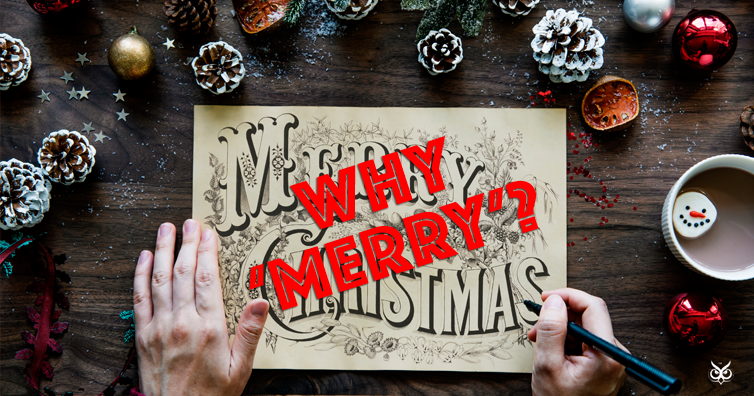Okay, this may seem like kind of a silly question, but have you ever wondered why do we say ‘Merry’ just for Christmas? I mean, why for every other occasion we go with ‘Happy’ except when it comes to Christmas?
Well, linguists can’t provide a solid explanation for this tendency except from the fact that “merry” is a much older world than “happy” and because of its early use on the Victorian Christma’s carols – the era that defined our Christmas customs.
Here’s how it goes (and why British say Happy Christmas instead of Merry Christmas). (the article continues after the ad)
First of all, it’s important to note that there is a difference between ‘merry’ and ‘happy’. According to linguist Arika Okrent, author of the book In the Land of Invented Languages: Adventures in Linguistic Creativity, Madness, and Genius![]() , “Happy and merry have similar meanings but slightly different connotations. Happy is an emotional condition, while Merry implies some specific sort of merrymaking behavior. Merry implies a bit more active showing of the happiness or at least some jaunty clicking of the heels.”
, “Happy and merry have similar meanings but slightly different connotations. Happy is an emotional condition, while Merry implies some specific sort of merrymaking behavior. Merry implies a bit more active showing of the happiness or at least some jaunty clicking of the heels.”
That being said, ‘merry’ is a much older word but even when the word ‘happy’ was born, both were used in Christmas greetings. However, during the 18th century, the use of ‘merry’ went into decline, but stuck around in phrases such as “the more the merrier” and of course, “merry Christmas”. Merry was also the word of choice for Dickens and in carols, so much so that the pull of merry grew stronger and it even changed the last line of “The Night Before Christmas”, which originally was “Happy Christmas to all and to all a good night.” Because this Victorian era Christmas traditions defined the way we celebrate Christmas, even today, we use ‘merry’ instead of ‘happy Christmas’. Not in England though.
THE BRITISH WAY
In England, they still use Happy Christmas. So, what happened there?
It seems that somehow, during the 19th century, ‘happy’ took a high-class sheen while ‘merry’ was more for the rowdy carollers. According to one critic of the term: “(merry) has a ridiculous excess of sentiment” while, on the other hand, ‘happy’ was more sedate and sober. This led to ‘happy’ being the preferred term of the royals – from King George V who held the first ever Christmas radio address and even to this day, when Queen Elizabeth II says ‘happy Christmas’ on her broadcasts. Because ‘happy’ was the royally-approved choice, it stuck and that’s why British still use the term ‘Happy Christmas’ instead of ‘Merry Christmas’.
So, yes, the British high-class is responsible for this difference between British and Americans as well (remember when we talked about The Surprising Reason Why Americans And British Have Different Accents?). People in the US were less concerned with that kind of things, so they stuck with ‘Merry Christmas’ which is the reason why today we say ‘Merry’ instead of ‘Happy Christmas’.
If you like what you read, then you will definitely love this one: Why Do We Say “A Pair Of Pants” When It’s Only One Garment?
Photo: rawpixel.com / Pexels
Photoshop: I’m A Useless Info Junkie
Sources: Why Do We Say ‘Merry’ Just for Christmas? | Why Do We Say Merry Christmas?



